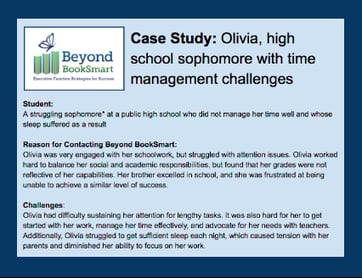Morning Mad Dash: 6:57 AM - Scrambling Out the Door
Olivia has to catch the bus at 7:30, and she likes to sleep in until 6:45 … and maybe hit the snooze button one or two times after that. That leaves her about half an hour to madly dash about the house eating breakfast, choosing an outfit, brushing her teeth, packing her lunch, changing after reconsidering her outfit, texting her friends, returning to the original outfit, and - if time allows - packing her homework from the night before. With this routine, Olivia has felt frustrated a few times when - despite assuring her teachers that she really, totally did the homework the night before - she hasn’t been able to actually turn it in and get credit.
The Way Forward: Plan Ahead for the Morning
Olivia’s tendency to use the snooze button isn’t the main issue; there’s a lack of planning on her part that makes the morning routine more frantic than it needs to be. In fact, we might even suggest enlisting the help of Snapchat for this (bear with us, here). Each night, Olivia could pick out three potential outfits and Snap them to her friends. Whichever gets the votes goes right to the on-deck area for the morning. She can also set up daily alerts for 8:30pm that walk her through a check-list of items she needs to pack up: lunch, homework folder, planner, textbooks, and gym clothes. This way, she can get to school with homework in hand - and looking her best.
Mid-Morning Attention Drain: 10:46 AM - Chemistry Class
Olivia doesn’t entirely mind school. She’s got friends she can chat with, and most of her classes are at least kind of interesting. But there’s one exception — chemistry, where Ms. Glurtman has a tendency to drone on for the full hour in a voice that’s somehow a combination of white noise and nails on a chalkboard. As much as Olivia would love to just tune her out completely, she has a chemistry quiz every week and tests twice a month, and she really needs to be able to hear and process what Ms. Glurtman is saying.
The Way Forward: Maintain Focus in Class
While she’d like to just blame Ms. Glurtman for a bad chemistry grade, Olivia does have some options to help her. Although it’s tough to maintain your attention when a subject that you find uninteresting is presented in a dull manner, learning to do so is part of developing Executive Function skills. Olivia can’t change Ms. Glurtman’s voice, but she can change what she does when she listens to it. That might start with posture. Sitting upright rather than slouched over might help Olivia ward off the boredom bots somewhat. So might the way she takes notes — by finding a method that works for her (jotting down key words, diagramming concepts, connecting chemistry to other aspects of her life), Olivia can keep her chemistry grade from being wrecked by a teacher whose favorite element is Boron.
Afternoon Work Delays: 3:24 PM - School’s Finally Over (sort of)
After Olivia has stepped off the bus and enjoyed an afternoon snack, she is confronted with the routine reminder that the school day isn’t quite over yet. Now, it’s homework time. Since Olivia used up so much mental energy trying to focus during Chemistry class, she’s feeling wiped out. Even though Mr. Calgary went light on the math problem set - Olivia’s favorite subject - the thought of getting started overwhelms her. She tells you she’ll start at 4pm, but when you ever-so-casually stroll by her room at 4:30, you see that she’s texting with a friend. She tells you she’s just about to start, but then your stealthy walk-by at 5:00 reveals a daughter mindlessly scrolling her Facebook page. At dinner, you ask again, and she assures you she’s totally ready to get started, but you hear YouTube videos when you walk past her room at 8:30pm. By now, you’re frustrated with Olivia, and she’s getting sick of seeing you walk by her door.
The Way Forward: Manage Distractions, Manage Time
Olivia’s tendency to put off her homework until the last possible minute is understandable. The amount of energy and attention students need to focus on classes all day leaves them with little gas in the tank to begin a homework session. Add in distractions from friends texting and a younger brother watching cartoons in the next room and Olivia’s task initiation skills are put to the ultimate test. Olivia could start by using the 30/30 app to set up her to-do list for the evening, taking advantage of the alarm sounds after each task to keep her moving forward with her work. If the distractions are the real barrier to getting started, she can try reducing their effect. She can use the Forest app on her phone to “plant” a tree on her phone so that while she works, it grows. If she touches her phone, the tree dies. If the distractions come through on her computer, installing Freedom might do the trick as this widget can block Olivia’s access to tempting websites for a set amount of time. And, of course, she needs to relocate far far away from her younger brother’s cartoon viewing before the theme song to SpongeBob SquarePants gets stuck in her head.
Although Olivia faces Executive Function challenges throughout the day, she has many options for how to address each one. Once she understands that these tough moments can be managed with the right strategies, it’s easier for Olivia to imagine the benefits of using better ways to plan her time, manage her attention, and resist distractions when she needs to get work done. Maybe a day in the life of a tenth grader doesn’t have to be so bad after all.
photo credit: Shutterstock
Please see this page for comprehensive information about Executive Function in high school students.
Read our case study of Olivia, a 10th grader who had time management struggles, to find out how her coach worked with her to overcome her challenges.


